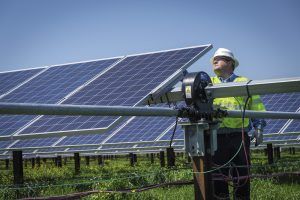Corporate greenwash stains Earth Day
By John Morales | April 22, 2021
 Screenshot of TV commercial by Florida Power & Light
Screenshot of TV commercial by Florida Power & Light
She looks to be about 12 or 13 as she smiles behind her safety glasses. In her hardhat, she confidently walks towards me as an oil-burning power plant blows up behind her. And ten seconds into the commercial she’s telling me how Florida Power & Light “made way for clean American-made ‘natural’ gas.” But don’t fret—many solar panels are shown, and I get to learn about how so-called green hydrogen will allow Florida Power & Light to “just grab some sun, add water, and there … cleaner energy for all of us!” The commercial, which airs frequently in Florida’s major television markets, is wafer-thin on details. It ends with the young girl sitting behind her parents in a Tesla, tugging at my heartstrings when she reminds me that her generation “deserves a future we can depend on.”
I’d settle for any non-dystopic future for my grandchildren, thank you very much.
Earth Day is here again. You can’t miss it. It’s not in the league of Halloween and Christmas, but the marketing push around the environmental consciousness day is hard to miss. For the 50th anniversary of Earth Day in 2020, the burgeoning pandemic did not slow down efforts from Hyundai, Michelob, Apple, SodaStream, Yeti, Timberland, and even NASA to tap into consumers’ swelling concern about Mother Earth. And that’s fine, as long as the companies have real and significant sustainability projects to share. But they very often don’t, and we all are being splattered with greenwash.
Take Florida Power & Light, to name just one local example of the nationwide phenomenon of corporate greenwashing. It is doing better than other Florida energy providers in that it no longer relies on an oil-burning power plant—the one in the commercial—which now has been repurposed as a gas-burning facility. In December, Florida Power & Light also shut down its last coal-fired plant in Florida and converted another to gas. More than 75 percent of the company’s power generation now comes from gas. But only eight percent comes from renewables, namely solar. Florida Power & Light says they want to install 30 million solar panels by 2030, but in a place dubbed the “Sunshine State” there are questionsabout the company moving the goalposts on solar energy generation.
I wouldn’t put it past them. The reason lies in some recent history.
In 2016, Florida utilities spent $20 million making the case to limit rooftop solar, almost half of which came from Florida Power & Light. It’s not so much the money spent; it is how they spent it. Consumers for Smart Solar, a fake grassroots group funded entirely by utilities and right-wing advocacy groups, pushed a measure onto the 2016 ballot that would have preserved the utilities’ monopoly and given the power companies the right to challenge any policy that favored solar power. The language of the proposed constitutional Amendment 1 was purposefully deceptive—“political jiu-jitsu” said the policy director of a conservative Koch-funded think tank. It was so deceiving that it was challenged in the courts, but in a 4-3 decision the Florida Supreme Court ruled that it wasn’t. All four Republican-appointed justices voted on the side of the utilities. In the end, it took a bigger grassroots campaign to raise awareness among voters about the real intent of Amendment 1, which was defeated only because it didn’t reach the 60 percent threshold required in Florida to change the constitution. Utilities, however, did manage to get 51 percent of the vote in favor of Amendment 1.
What about that water and sunshine thing—green hydrogen? It is indeed part of Florida Power & Light’s parent company, NextEra’s, plans. It’s a pilot project that would bring a 20-megawatt electrolyzer online by 2023 to produce hydrogen—a process that separates hydrogen atoms from the oxygen atom in water molecules. It takes energy to accomplish this, but if it comes from renewable sources like solar, then it truly can be entirely “green.” The problem is that 20 megawatts would represent just two percent of Florida Power & Light’s energy portfolio. The overall timeline for hydrogen significantly denting the fossil fuel energy needs of the economy may be way too slow. In the case of Florida Power & Light’s energy portfolio, green hydrogen plus current solar capacity would only get us up to 1-out-of-10 watts coming from renewable sources.
It’s difficult to reconcile a hard marketing push that attempts to frame Florida Power & Light as working towards a better future when the facts show that it’s not doing so quickly enough, and often working in deceitful ways—like Amendment 1—towards the exact opposite. A 2021 study by the Sierra Club shows that Florida Power & Light scored an “F” on a scale based on retiring coal, adding gas, and building new clean energy assets.
And it’s not just any ol’ “F.” Florida Power & Light scored 0 out of 100!
In fairness, the mean score among utilities was 17. But they weren’t graded on a curve. The Sierra Club goes on to say, “while many electric utilities have pledged to decarbonize, their goals fall far short of what is necessary to protect people and the planet.”

That is an important point. Florida Power & Light is far from the only corporation saying one thing and doing another. Think of the thousands of Volkswagen “clean diesel” vehicles equipped with software designed to cheat on emissions tests, or BP’s “beyond petroleum” slogan that had to be abandoned after oil spills in Alaska and the Gulf of Mexico. Utilities as well as many other corporate sectors of our economy routinely donate to science-denying, climate-action-blocking politicians that are actively fighting a green-energy transition, only to publish glossy annual reports that are dripping green as they exaggerate their environmentalism. With as many as 40 percent of company claims about being pro-environment deemed to be misleading or overstated, concerns regarding the spread of greenwashing have prompted the Biden administration to potentially regulate the practice as part of the overall multi-agency efforts on tackling the climate risk.
I suspect many readers of The Bulletin of the Atomic Scientists are keen to spotting greenwashing when they see it. But I also suspect that most of the population is not. These type of deflection campaigns aren’t just alive, they’re thriving and expanding according to climate scientist Michael Mann in his new book The New Climate War. (Mann is one of the researchers who coined the term “hockey stick” to describe how our carbon emissions and temperatures look on a graph over time: a slow rise, followed by a steep increase with the dawn of the Industrial Revolution and the widespread use of coal and other fossil fuels.) Special interests are seeking to shift the burden of climate action from broad and urgently needed environmental regulations to small individual actions that, even collectively, are simply inadequate in turning the tide on global warming. With climate concern at an all-time high in the United States, there is ample opportunity for corporate entities to tap into people’s emotions and deflect the public’s attention from desperately-needed systemic changes required to curtail greenhouse gas emissions.
This Earth Day, let’s continue to call out polluters and hold them accountable for the environmental degradation they’ve caused. Act individually, sure—but demand governmental actions that can get us on track to a safer Earth for our children, grandchildren, and all the critters I hope they’ll still share the planet with.
And don’t get splattered with greenwash.
Together, we make the world safer.
The Bulletin elevates expert voices above the noise. But as an independent nonprofit organization, our operations depend on the support of readers like you. Help us continue to deliver quality journalism that holds leaders accountable. Your support of our work at any level is important. In return, we promise our coverage will be understandable, influential, vigilant, solution-oriented, and fair-minded. Together we can make a difference.
Keywords: Earth Day, climate change, climate crisis, global warming, greenwashing
Topics: Climate Change, Columnists, Opinion, Personal Essay















